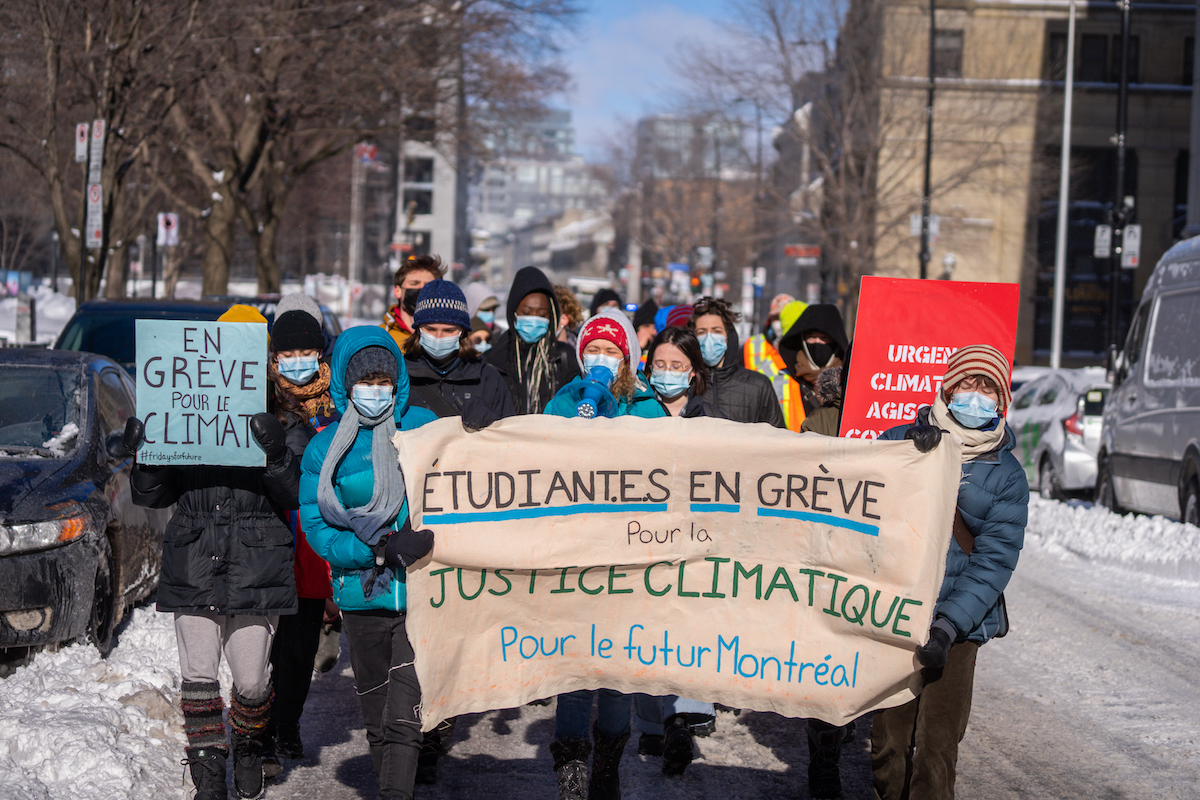For the past two Fridays, climate activists gathered to demand the federal government to refuse the project
Since Friday, Feb. 18, the Pour le futur student-run organization of climate activists have been skipping school to march every Friday afternoon to protest against the Bay du Nord (BdN) oil project. The organization took to the streets of Montreal again on Feb. 18 to demand the federal government to refuse the project, claiming it was incompatible with Canada’s climate targets.
The decision to go on strike for three weeks was meant to catch the attention of Steven Guilbault, Canada’s minister of environment and climate change, before his deadline to approve the project on March 6.
“We really want to put pressure on Guilbault […] to make the right decision for this project,” said Leticia Gonzalez, an organizer for Pour le futur.
The BdN project will be developed in St. John’s, Newfoundland and Labrador, if approved. Three oil resources locations were found in the area.
The project aims to extract 300 million to 1 billion barrels of oil over 30 years from 2028 when the project is supposed to begin operation.
Pour le futur’s goal is to create urgent action towards the current climate crisis, and they believe the BdN oil project is incompatible with the Intergovernmental Panel on Climate Change (IPPC) suggestions. The IPPC’s report clarifies limiting global warming to 1.5 degrees Celsius, and the BdN project contributes to fossil fuel emissions.
Canada has pledged to reduce emissions by 40-45 per cent below 2005 levels by 2030. Another of Canada’s targets is to be carbon neutral by 2050 and reduce greenhouse gas emissions by 50 per cent by 2030.
“One of the first things we have to do is stop investing and stop allowing new oil exploitation projects,” said Shirley Barnea, spokesperson for the Pour le futur.
“That means in 2058, we’re still going to be producing oil. The entire world is supposed to be carbon neutral by 2050, and [the project] is completely against all of that,” she added.
Minister of Industry, Energy and Technology Andrew Parsons described a few weeks ago the BdN project as “critical” for Newfoundland and Labrador’s economy.
A report from Statista shows that mining, quarrying, and oil and gas extraction accounted for 40.45 per cent of the gross domestic product (GPD) of Newfoundland and Labrador in 2020.
Due to the pandemic affecting the demand and supply chain, production decreased at every oilfield in Newfoundland in 2021 with total oil production down 9.5 per cent. Moreover, the corresponding value of production increased by 43.4 per cent. These prices compensate for the production decline.
“The one benefit [of this project] it’s that it’s going to help the economy. […] We think the way forward is for the government to invest in a just transition so that we can help the workers that are working in oil right now transition into something else because it doesn’t make sense to keep investing in something that’s killing the planet,” said Barnea.
According to Equinor’s website, the project will generate about $3.5 billion in revenue for the government of Newfoundland and Labrador.
“Right now, we’re focusing on BdN because it’s just such a polluting project that we really can’t afford to be building right now, but after hopefully if that’s rejected, we really want to push the government […] to deliver on a just transition that was promised in the 2019 elections,” said Barnea.
The last demonstration against the BdN will be on March 4 at the Montreal City Hall at 1:30 pm.
“The idea [is] to put as much as much pressure as we can on the government,” Barnea added.
Photo by Gabriel Pelland




